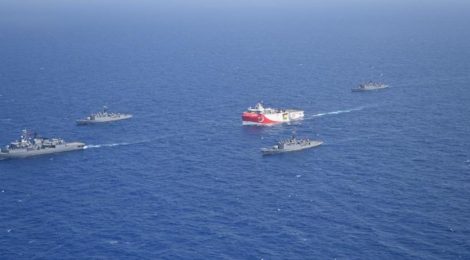
Navies of Turkey, Greece, and France in Dangerous Exercises Amid Greece-Turkey Tensions
Navies of Turkey, Greece, and France in Dangerous Exercises Amid Greece-Turkey Tensions
Greece and Turkey appear to be on a collision-course over their dispute over ownership and drilling rights in a disputed part of the Mediterranean Sea between Greece and Cyprus.
Turkey announced that the research ship Oruc Reis and two auxiliary ships would begin exploratory drilling in the disputed region of the sea. The ships are expected to be in the area from August 10 to August 23. The Turkish Defense Ministry announced that Turkish navy ships are accompanying the Oruc Reis as a protective force.
Tweet and photos from the Turkish Defense Ministry:
1. Türkiye’nin Doğu Akdeniz’deki deniz yetki alanlarında sismik araştırma faaliyetine başlayan MTA ORUÇ REİS araştırma gemisine Türk Deniz Kuvvetleri tarafından refakat ve koruma sağlanmaktadır. pic.twitter.com/y58Fcv1d4i
— T.C. Millî Savunma Bakanlığı (@tcsavunma) August 10, 2020
Turkish military ships are also in the area, and to add to the tension, Greece and France just announced joint naval military exercises in that area, along with Cyprus. This follows joint naval exercises in the last week of July between the French and Egyptian navies in the same region.
On August 9, 2020, the Greek military cancelled all military leaves and ordered troops to report for duty, in anticipation of a possible clash with Turkey.
This move comes only days after Greece and Egypt signed an agreement on economic zones for drilling rights and maritime boundaries in the eastern Mediterranean. The Turks claim that this agreement purposely shuts them out of the area.
Turkey and Greece have a long-standing dispute over sovereignty and economic access to resources in the Aegean and Mediterranean Seas. Greece has nearly 6,000 islands and islets scattered in the Aegean and Ionian Seas, of which only 227 are inhabited. Many of these islands sit just off of Turkey’s west coast, thereby limiting Turkish maritime zones. The Aegean and eastern Med are believed to contain rich deposits of natural gas and oil, which is a primary reason for this dispute.
Egypt and Greece are cooperating in this, and that is significant, as Egypt and Turkey are both involved in the Libyan Civil War, backing opposing sides. France is also supporting the Libyan LNA faction, as is Egypt, which puts France on the same side as Egypt and Greece. Cyprus is involved because the natural gas deposits are also in their backyard, and the Cypriot government has good reason to dislike Turkey since Turkish forces have occupied the northern third of Cyprus since the 1974 Turkish invasion of the island.
